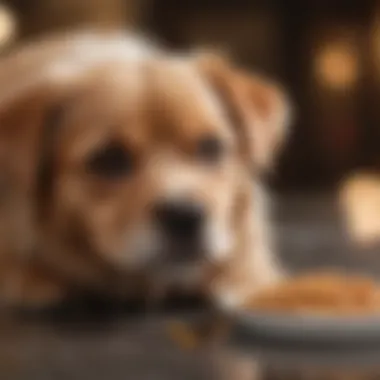Managing Diarrhea in Small Dogs: Essential Care Guide


Intro
Diarrhea in small dogs is more than a mere inconvenience; it can signify underlying health issues. It is a common concern yet poses serious implications if not managed properly. Understanding the root causes and the best strategies for management can significantly improve your pet's health and comfort. This section provides a foundation for recognizing potential problems and appropriately addressing them.
Understanding Your Pet
Breed Traits
Different breeds exhibit unique traits that influence their health, including digestive systems. For instance, small breeds like Chihuahua or Dachshund can be more sensitive to dietary changes, making them vulnerable to digestive disturbances. Hence, owners should note these traits when observing symptoms of diarrhea.
Common Temperaments
Small dogs are often energetic and social. Their temperament can affect their eating habits, thereby influencing digestive health. For instance, anxious dogs may eat quickly, leading to digestive upset. Recognizing these behavioral patterns is essential in understanding how they contribute to conditions like diarrhea.
Special Needs
Small dogs may require special dietary considerations to prevent gastrointestinal issues. Their smaller size demands precise nutritional management. Some may have allergies or intolerances that require tailored diets. Always consider your dog's unique needs and consult a veterinarian when introducing new foods.
Pet Care Essentials
Nutrition and Feeding Guidelines
Providing a balanced diet is crucial. Quality dog food, ideally composed of easily digestible ingredients, is essential. Avoid sudden changes to their diet, as a transition period helps prevent gastrointestinal distress. Use small, frequent meals to aid digestion.
Grooming Tips and Techniques
Maintaining cleanliness can aid in preventing infections that lead to diarrhea. Regular grooming, particularly cleaning the rear area, ensures hygiene. This is especially vital for long-haired breeds which may trap waste.
Health and Wellness
Routine veterinary check-ups are critical. They help identify potential health problems early on. Vaccinations and parasite control can also prevent illnesses that cause diarrhea. Monitor your dog's weight and overall health closely.
Training and Behavior
Basic Training Techniques
Establishing good behaviors regarding eating or bathroom habits can help. Teach your dog to eat slowly, which may reduce the chances of gastrointestinal upset. Basic commands can contribute to overall wellness by ensuring your dog is under control during one-on-one feeding sessions.
Behavioral Problems and Solutions
If diarrhea persists, behavioral issues may be involved. Stress can be a significant trigger. Identify and mitigate stressors in their environment. Environmental stability fosters a sense of security, benefiting their emotional and physical health.
Mental Stimulation Activities
Mental activities like puzzle toys can reduce stress and distract dogs from eating too quickly. Engaging the mind can also prevent boredom that sometimes leads to unwanted feeding behaviors.
Engaging with Your Pet
Interactive Games and Toys
Use toys that encourage slow feeding. This slows down their consumption of food and helps in digestion. Interactive games foster mental engagement while promoting physical activity, reducing stress and associated digestive problems.
Safe Outdoor Activities
Walks are vital for their physical health. Determine a safe route, avoiding areas with excessive waste or hazardous substances. Outdoor activities should be enjoyable and stress-free to positively influence their overall health.
Family-Friendly Pet Interactions
Encourage a harmonious household. Ensure each family member understands how to interact with your small dog gently. Consistent, caring interactions reduce anxiety and promote a calmer environment, thereby helping maintain optimal health.
Pet Adoption and Integration
Choosing the Right Pet for Your Lifestyle
Not every small dog is suitable for every setting. Assess your lifestyle before adopting. Certain breeds may require more activity or special care, which influences their chance of developing health issues like diarrhea.
Preparing Your Home for a New Pet
Before bringing a dog home, ensure the space is pet-friendly. Remove potential hazards and create a designated area for eating and sleeping. This stability helps in their adjustment period, reducing anxiety and digestive issues.
Tips for Smooth Prologue


When introducing your new dog to the family, proceed gradually. Allow them to explore their new environment at their own pace. A calm and structured introduction decreases stress and promotes a healthy transition.
Closure
Addressing diarrhea in small dogs involves understanding their unique needs. From proper nutrition to creating a supportive environment, each aspect contributes to their health. Proactive management and awareness can ensure that your small dog remains comfortable and happy.
Understanding Diarrhea in Small Dogs
Understanding diarrhea in small dogs is essential for those who care for these pets. Diarrhea can often indicate underlying health conditions or dietary issues that require attention. Small dogs are particularly susceptible due to their size and unique digestive systems. Gaining insight into the causes and types of diarrhea can help pet owners react promptly and effectively. This understanding also helps in preventing further health complications that may arise from untreated diarrhea.
Definition and Types of Diarrhea
Diarrhea is defined as an increase in the frequency and looseness of stools. In small dogs, this condition can manifest in various forms, each signifying different issues within the digestive tract. Key types include:
- Acute Diarrhea: This is sudden and usually short-lived, often caused by dietary indiscretion, infections, or parasites.
- Chronic Diarrhea: Lasting more than a few weeks, chronic diarrhea may indicate more serious health problems, such as inflammatory bowel disease or cancer.
- Hemorrhagic Diarrhea: This type includes blood in the stool and can be a sign of severe conditions that require immediate veterinary care.
Recognizing these types is critical, as it shapes the approach to treatment and diagnostics.
Significance of Recognizing Diarrhea Early
Identifying diarrhea early can significantly impact the health of a small dog. Early recognition allows for timely intervention, which can prevent complications like dehydration or severe gastrointestinal distress.
It is also beneficial to observe if diarrhea occurs often or is part of a pattern. Noting any accompanying symptoms, such as vomiting or lethargy, can provide vital information for a veterinarian.
Common Causes of Diarrhea
Understanding the common causes of diarrhea in small dogs is essential for effective management and care. This knowledge allows pet owners to act quickly and appropriately in preventing further health complications. Recognizing the root cause can also inform dietary adjustments and guide conversations with veterinarians.
Dietary Indiscretion
Dietary indiscretion describes instances when a dog consumes something it should not. This can include human food, spoiled items, or foreign objects. Small dogs are particularly prone to these behaviors due to their curious nature and smaller size. Pet owners should remain vigilant, as this can lead to gastrointestinal upset.
Signs may include a sudden onset of diarrhea, potential vomiting, or signs of discomfort. A thorough investigation of recent dietary changes or food sources is critical. It may be beneficial to keep track of any human foods given, whether intentional or accidental, as these can be indicators of dietary indiscretion.
Infections and Parasites
Infections and parasites present another significant cause. Various pathogens can disrupt the dog's digestive system, leading to diarrhea. Common issues include bacterial infections, such as Salmonella or E. coli, and parasites like Giardia and roundworms.
Regular veterinary check-ups are vital for preventing infections. Furthermore, ensuring vaccinations are up to date will help guard against certain diseases that can cause diarrhea. If diarrhea persists or is accompanied by other symptoms such as fever or lethargy, timely consultation with a veterinarian is advisable.
Allergies or Intolerances
Allergies and food intolerances can manifest as gastrointestinal disturbances in small dogs. Some dogs may react adversely to specific ingredients in their food. This can include proteins like beef, chicken, or grain fillers. Identifying these triggers can be challenging, as reactions may not be immediate and can vary in severity.
Two primary symptoms often accompany food allergies: diarrhea and skin irritations. Keeping a detailed food diary can help pinpoint the specific allergen. Eliminating suspected allergens from the diet and introducing hypoallergenic food may provide relief.
Underlying Health Issues
Underlying health issues encompass a broad array of potential problems that may cause diarrhea in small dogs. These can include conditions like pancreatitis, liver disease, or gastrointestinal disorders. Understanding that diarrhea can be a symptom of a more significant health concern is crucial.
Regular veterinary exams can help identify chronic health issues before they become severe. If diarrhea is recurrent or persistent, further diagnostics may be needed to uncover underlying causes.
Addressing the causes of diarrhea early can lead to better outcomes for small dogs. Proper management hinges on the ability to recognize and respond to these triggers.
Symptoms to Monitor
Monitoring symptoms is a crucial aspect of managing diarrhea in small dogs. By paying close attention to your pet's behavior and physical condition, you can make informed decisions about their care. Recognizing the symptoms early can make a significant difference in the outcome, preventing further complications and promoting a swift recovery.
Frequency and Consistency of Stool
The frequency and consistency of your dog's stool can provide valuable insights into their health status. Diarrhea is typically characterized by loose or watery stools. Observing how often your dog goes outside to relieve itself is equally important.
- Normal Range: A healthy dog usually goes two to four times a day. If you notice an increase beyond this range along with loose stool, it could indicate a problem.
- Tracking Changes: Keeping a log of your dog's bowel movements can help track improvements or further declines. Changes in the feces can signal issues from simple dietary indiscretion to more serious health concerns.
Accompanying Signs of Illness
In addition to monitoring stool quality, observing other symptoms can help assess your dog's overall health.
- Lethargy: If your dog seems unusually tired or refuses to play, it might indicate that their condition is more serious.
- Vomiting: The presence of vomiting alongside diarrhea can suggest a gastrointestinal issue that requires immediate veterinary attention.
- Appetite Changes: Lack of interest in food can often correlate with digestive troubles. If your dog stops eating for more than a day, it's time to consult a veterinarian.
Proper monitoring of these signs can lead to early detection of serious issues, improving the chances of effective treatment.


Duration of Diarrhea Episodes
How long your dog experiences diarrhea is another important factor. Short episodes may not be as concerning as those lasting more than a day.
- Acute Diarrhea: Often resolves within a day or two and may be related to something minor, such as a dietary mishap.
- Chronic Diarrhea: If diarrhea continues beyond a couple of days, it can indicate underlying health issues that could worsen without appropriate intervention.
Keep track of how many days your dog has diarrhea and correlate this with other symptoms. This information is crucial when discussing your dog’s health with a veterinarian.
Overall, being attuned to these symptoms will empower you to take immediate and informed actions, which is vital for your pet's well-being.
Immediate Care Steps
Immediate care is crucial for managing diarrhea in small dogs. Taking the right actions swiftly can significantly affect their recovery. The initial steps provide both immediate relief and set the foundation for restoring regular digestive function. Owners should understand these steps and implement them without delay to minimize discomfort and complications.
Withholding Food Temporarily
Withholding food for a short period, typically 12 to 24 hours, is often recommended when a dog is experiencing diarrhea. This step allows the gastrointestinal system to rest. It is important to note that this does not mean withholding water. Ensuring access to fresh water during this time is vital for hydration.
Considerations:
- Assess the dog’s overall condition before deciding to withhold food. If the dog is lethargic or shows other concerning symptoms, consult a veterinarian.
- Young puppies and very small dogs may require more frequent feeding, even when experiencing diarrhea. Careful observation is necessary in these cases.
Providing Fresh Water
Maintaining hydration is one of the most important aspects of immediate care. Diarrhea can quickly lead to dehydration, especially in small dogs. Providing fresh water helps to replenish lost fluids and electrolytes. A clear, accessible water source encourages fluid intake.
Tips:
- Offer water frequently, but avoid overloading the dog in one go. Small sips often are more effective.
- In some situations, it may be beneficial to provide an electrolyte solution designed for pets.
Gradual Diet Intro
After a short fasting period, it is essential to reintroduce food gradually. Start with bland diets that are easy to digest. Common options include boiled chicken without skin and plain white rice. Transitioning back to regular food should be done slowly over several days to avoid overwhelming the digestive system again.
Guidelines:
- Begin with small portions of the bland diet. Monitor for any signs of distress or returning diarrhea.
- Gradually incorporate returning the regular diet alongside the bland food. This can be done over three to five days.
Remember: If symptoms persist during these steps or if your small dog shows signs of dehydration or distress, it is crucial to consult a veterinarian immediately. Proper intervention can prevent further complications and ensure the health of your pet.
Hydration Management
Hydration is a critical aspect of managing diarrhea in small dogs. When a dog experiences diarrhea, they can lose vital fluids and electrolytes very quickly. This makes timely hydration management essential to prevent dehydration, which can lead to serious complications. Pet owners need to understand the signs of dehydration and employ strategies to ensure their dogs remain hydrated.
Signs of Dehydration
Recognizing the signs of dehydration can be tricky, especially in small dogs. Here are some indicators that may signal your dog needs more fluids:
- Dry gums and tongue: Check to see if the gums are sticky or have a dry appearance. Healthy gums should be moist and pink.
- Reduced skin elasticity: Gently pinch the skin on the back of the neck. If it does not return quickly to its normal position, this may be a sign of dehydration.
- Lethargy: A dehydrated dog may seem tired or less active than usual.
- Diminished urination: If your dog is urinating less frequently, it could indicate dehydration.
It’s important to monitor your dog closely for these signs, as even mild dehydration can escalate quickly.
Encouraging Fluid Intake
Ensuring your dog drinks enough fluids is paramount. Here are several strategies that can encourage them to stay hydrated:
- Fresh water availability: Always have fresh water accessible. Change it often to ensure it stays appealing.
- Flavoring options: Adding low-sodium chicken or beef broth to water can make it more enticing.
- Hydration aids: Consider using water-rich foods like canned pumpkin or plain yogurt in small amounts to help increase fluid intake.
- Frequent small servings: Instead of giving a large bowl of water, offer small amounts frequently. This can help if their appetite fluctuates.
“The goal is to make drinking water an easy and pleasant experience for your dog.”
Tracking your dog’s fluid input is essential. Keep an eye on their behavior and adjust their water supply as needed. If there are signs of severe dehydration, it is vital to consult a veterinarian promptly for more intensive care.
Dietary Adjustments
Dietary adjustments play a crucial role in managing diarrhea in small dogs. When a dog experiences digestive disturbances, modifying their diet can help alleviate symptoms and promote recovery. Understanding the specific nutritional needs during this time is essential for pet owners.
It is important to consider the following elements when making dietary adjustments for your small dog:
- Digestibility: Foods that are easy to digest help reduce the strain on the intestines. This allows for more rapid recovery and less discomfort.
- Nutrient Balance: Even during a dietary change, dogs still need essential nutrients. Balanced meals support their immune system and overall health.
- Hydration: Changing a dog's diet impacts their fluid intake. Ensuring they remain hydrated is key, especially during diarrhea.
Overall, proper dietary adjustments can shorten the duration of diarrhea episodes and prevent dehydration. This is particularly vital for small dogs, who can become dehydrated quickly.


Bland Diet Recommendations
A bland diet is often recommended when managing diarrhea. Foods that are low in fat, gentle on the stomach, and easy to digest are ideal. Common suggestions include:
- Boiled white rice: This serves as a good base, providing energy while being easy on the stomach.
- Plain boiled chicken: Skinless and boneless chicken is a good protein source that is easy to digest.
- Pumpkin: Canned pumpkin (not the spiced pie filling) can help firm up stools due to its fiber content.
Introduce these foods in small amounts. Monitor your dog for any signs of improvement or worsening. If symptoms persist, it is prudent to consult a veterinarian.
Gradual Return to Regular Diet
Once your dog's diarrhea improves, a gradual reintroduction of their regular diet is essential. Sudden changes can shock the digestive system, leading to a relapse of symptoms. Follow these steps for a successful transition:
- Start Slow: Begin by mixing a small portion of the regular food with the bland diet from earlier.
- Increase Gradually: Over several days, increase the amount of regular food while reducing the bland diet.
- Watch for Reactions: Keep an eye on your dog for any adverse reactions during the transition. If diarrhea returns, revert to the bland diet and consult a veterinarian.
Incorporating these steps allows your dog to adjust carefully, ensuring better digestive health moving forward. Dietary adjustments are not only about addressing immediate symptoms; they also lay the foundation for long-term gut health.
When to Consult a Veterinarian
Understanding when to seek veterinary care for a small dog exhibiting diarrhea is crucial. This knowledge can make a significant difference in the health and recovery of your pet. Timely intervention helps prevent complications, ensuring that minor issues do not escalate into severe conditions. Below are key indicators that warrant a consultation with a veterinarian.
Persistent Diarrhea
Persistent diarrhea is a major concern for pet owners. If your small dog's diarrhea lasts more than 24 hours, it is essential to consult a veterinarian. Prolonged diarrhea can lead to dehydration, especially in smaller breeds that are more susceptible to rapid fluid loss. Consider factors such as the frequency of bowel movements and any visible changes in the stool's consistency or color. Ignoring this condition could result in significant health risks that may necessitate emergency care. Addressing this symptom early may prevent complications that could be costly both financially and in terms of your dog’s well-being.
Presence of Additional Symptoms
If your dog shows additional symptoms alongside diarrhea, seeking professional help is advisable. Symptoms such as vomiting, lethargy, fever, or refusal to eat may indicate more serious underlying health issues. A combination of diarrhea with these symptoms often signals infections or other medical conditions requiring immediate attention. Monitoring your dog’s behavior and overall health alongside bowel movements provides valuable information when discussing your concerns with a veterinarian. Prompt consultation can facilitate faster diagnosis and treatment, enhancing the chances of a full recovery.
Impact on Overall Health
Diarrhea can directly impact a dog's overall health, leading to significant issues if not managed correctly. Small dogs may struggle to maintain optimal nutrition if diarrhea persists, resulting in weight loss and weakened immune responses. Dehydration caused by diarrhea further complicates their health status. Regular assessments of your dog’s hydration and energy levels are necessary, and if noticeable declines occur, veterinary attention is critical. An assessment with a vet can determine whether there are underlying health concerns that need ongoing management or specific treatments to restore health.
Consulting a veterinarian early can prevent minor concerns from becoming major health crises.
Preventive Measures
Preventing diarrhea in small dogs is crucial for their overall health and well-being. Just like humans, dogs can suffer from digestive issues. Early preventive measures can minimize the risk of such occurrences and ensure that pet owners can avoid the stress and complications associated with diarrhea.
Maintaining a Consistent Diet
A consistent diet is essential for small dogs. Dogs thrive on routine, and a change in food can disrupt their digestive system. This does not mean you must stick to a single product forever, but it is wise to choose a high-quality dog food and maintain its usage as much as possible.
- Gradual Changes: When introducing new food, it is critical to transition slowly. Mix the new food with the current one over several days to avoid gastrointestinal distress.
- Read Ingredients: Look for food that lists protein sources, like chicken or lamb, without fillers or artificial preservatives.
- Avoid Human Food: Refrain from giving your dogs table scraps or human food as it can lead to dietary indiscretion.
Regular Veterinary Check-ups
Regular veterinary check-ups serve as an essential part of preventive care. Routine visits can help in early detection of potential health concerns, including anything that might lead to digestive challenges such as diarrhea.
- Vaccinations and Preventatives: Stay updated on important vaccines and parasite preventatives. These help to protect against infections that might cause diarrhea.
- Health Monitoring: Your veterinarian can monitor the overall health of your dog, including weight and dental check-ups which indirectly support good digestion.
- Tailored Advice: Every dog is different. Your vet can offer specific dietary and health advice tailored to your dog's needs.
Understanding Food Triggers
Identifying food triggers is a vital aspect of preventing diarrhea. Some small dogs may have sensitivities or allergies that can upset their stomachs, especially when exposed to certain ingredients.
- Common Allergens: Pay attention to ingredients like grains, soy, and certain meats, which are known to cause reactions in some dogs.
- Food Diary: Keep a food diary to monitor what your dog eats and note any reactions. Document any changes in stool consistency or behavior following particular meals.
- Consult Veterinarian: Engage your veterinarian in this process. They may suggest elimination diets to identify which foods are causing issues.
Prevention is often simpler and less stressful than treatment. By keeping a consistent diet, attending regular veterinary check-ups, and understanding food triggers, pet owners can help protect their small dogs from developing diarrhea.
The End
Addressing diarrhea in small dogs is vital for ensuring their overall health and well-being. This article has explored various aspects of the issue, including causes, symptoms to monitor, and important steps for immediate care. Pet owners must be vigilant and understand the specific needs of their furry companions.
Recap of Key Points
- Diarrhea can stem from dietary indiscretion, infections, or underlying health issues.
- Monitoring the frequency, consistency, and duration of diarrhea is crucial.
- Immediate actions include withholding food temporarily and ensuring continuous access to fresh water.
- Hydration is especially important, as small dogs are more vulnerable to dehydration.
- Dietary adjustments play a critical role in management and recovery.
- Consulting a veterinarian is imperative in cases of persistent diarrhea or concurrent symptoms.
Being informed about these points helps pet owners act swiftly when encountering this common health issue. The earlier one takes appropriate action, the better for the dog's health.
Final Thoughts on Managing Diarrhea
Managing diarrhea in small dogs requires observation and prompt action. By recognizing symptoms early and implementing care strategies like a bland diet and hydration, pet owners can often address situations effectively at home. However, it is essential to remain cautious.
Pet owners should not hesitate to consult with veterinarians if there are any concerns. Taking proactive measures ensures not only recovery from diarrhea but also contributes to the overall health and happiness of small dogs.
It is crucial to remember that a dog’s health is connected to prompt care and informed decision-making.
Ultimately, enhancing knowledge about this condition empowers owners to better care for their pets.



